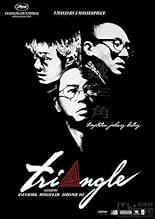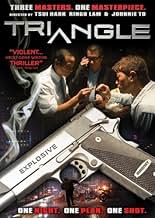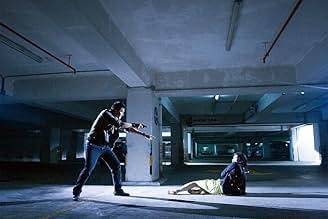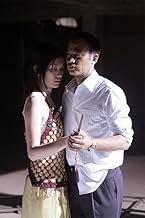AVALIAÇÃO DA IMDb
6,2/10
2 mil
SUA AVALIAÇÃO
Adicionar um enredo no seu idiomaTold in three 30-minute segments, three friends seek out the buried treasure of a mysterious stranger.Told in three 30-minute segments, three friends seek out the buried treasure of a mysterious stranger.Told in three 30-minute segments, three friends seek out the buried treasure of a mysterious stranger.
- Direção
- Roteiristas
- Artistas
- Prêmios
- 2 vitórias e 1 indicação no total
Honglei Sun
- Mok Chung Yuan
- (as Sun Hong Lei)
Ka-Tung Lam
- Wen
- (as Lam Ka Tung)
Kai Wa Chan
- Kwan
- (as Chan Kai Wa)
Chun Yip
- Chan Fok-sui
- (as Yip Chun)
Libby Brien
- Fai's Mother
- (English version)
- (narração)
- …
Philip Hersh
- Wen
- (English version)
- (narração)
Chi-Shing Chiu
- Mob Boss
- (não creditado)
Avaliações em destaque
Fear not: the juicy premise of putting three masters of HK violent cinema in one movie delivers one of the most entertaining action movies of 2007.
The film is a palpable thrill-ride, with an air of unmistakable cool and sheer brassiness of style. With scarcely time to slow-down, the silly and initially confusing but heavily entertaining and ultimately straightforward plot runs through a hundred twists and turns on its way to the seat-gripping finale that is the last third of the film.
The three segments directed by Tsui Hark, Ringo Lam and Johnny To (apparently in that order, although it was not indicated in the film) are distinct in style and mannerism, but near-seamlessly integrated into a single experience. Not only did they use three directors, they also used multiple script-writers. Do not expect any section-markers here, though: it is not three stories, but one story told in three consecutively more elaborate segments which represent the vision and prowess of one director each - without, however, appearing needlessly patched-together or unfocused. So, to compare this to that other Asian 3-in-1 package, the excellent Three Extremes (with Takashi Miike, Fruit Chan and Park Chan-Wook), is to miss the point. Here we are dealing with a unitary experience, one not divisible by three.
Fans of each director will find much to comment on the stylistic differences between each section. Best known perhaps for his kung-fu productions (at least in the West), the multi-talented Tsui Hark delivers a cool, crafty ambiance in his piece. Ringo Lam, a long-line police action-drama director, likewise carries the torch with a surprisingly mellow and tactful show-of-hands. It is really the last segment of the film, under the steady hand of the miracle-worker Johnny To - the brilliant director of gems such as Election I & II and Exiled - that really puts this work in the category of must-see cinema. It would be impossible to describe just what makes the last act so good without giving something away, but suffice to say the success lies in its mixture of suspense, action and black humour in a dazzling tour-de-force. And yet, To's section makes sense only in the context of the whole; it would not be possible to appreciate the finale without going through the first and second acts. The third act is the charm, but only because the first two acts lead to it and suggest it with force and clarity. By its combination of three geniuses, the impeccable thrill of the film gets multiplied by three, making the end result something greater than the sum of its parts.
The actors are adequate and the chemistry between them works well. This is not an especially 'deep' thinking-man's movie by any stretch - character-development especially is among the real weaknesses of this movie - but for what it's worth, the characters deliver their lines and express their emotional range quite convincingly (with a few notable exceptions). The fraternal chemistry between the main characters saves much of the hapless script. But really, this film is about action, violence, crime, morality and love - the stuff of entertainment. Maybe not serious or tight enough for some, the over-the-top story proves highly entertaining as a backdrop for the stylish visual work emanating from the three great directors.
I'm willing to forgive this movie its obvious shortcomings: its unexplained plot-ends and side-tracks, its focus on action and shine over drama and substance, its use of three writers in the seemingly impossible task of writing a single storyline. Bottomline: It works! Sometimes heckling about details seems petty when what is iffy in ideation is saved in execution. Minor script is turned into a major movie.
Absolute entertainment, with a touch - or two, or three - of genius.
The film is a palpable thrill-ride, with an air of unmistakable cool and sheer brassiness of style. With scarcely time to slow-down, the silly and initially confusing but heavily entertaining and ultimately straightforward plot runs through a hundred twists and turns on its way to the seat-gripping finale that is the last third of the film.
The three segments directed by Tsui Hark, Ringo Lam and Johnny To (apparently in that order, although it was not indicated in the film) are distinct in style and mannerism, but near-seamlessly integrated into a single experience. Not only did they use three directors, they also used multiple script-writers. Do not expect any section-markers here, though: it is not three stories, but one story told in three consecutively more elaborate segments which represent the vision and prowess of one director each - without, however, appearing needlessly patched-together or unfocused. So, to compare this to that other Asian 3-in-1 package, the excellent Three Extremes (with Takashi Miike, Fruit Chan and Park Chan-Wook), is to miss the point. Here we are dealing with a unitary experience, one not divisible by three.
Fans of each director will find much to comment on the stylistic differences between each section. Best known perhaps for his kung-fu productions (at least in the West), the multi-talented Tsui Hark delivers a cool, crafty ambiance in his piece. Ringo Lam, a long-line police action-drama director, likewise carries the torch with a surprisingly mellow and tactful show-of-hands. It is really the last segment of the film, under the steady hand of the miracle-worker Johnny To - the brilliant director of gems such as Election I & II and Exiled - that really puts this work in the category of must-see cinema. It would be impossible to describe just what makes the last act so good without giving something away, but suffice to say the success lies in its mixture of suspense, action and black humour in a dazzling tour-de-force. And yet, To's section makes sense only in the context of the whole; it would not be possible to appreciate the finale without going through the first and second acts. The third act is the charm, but only because the first two acts lead to it and suggest it with force and clarity. By its combination of three geniuses, the impeccable thrill of the film gets multiplied by three, making the end result something greater than the sum of its parts.
The actors are adequate and the chemistry between them works well. This is not an especially 'deep' thinking-man's movie by any stretch - character-development especially is among the real weaknesses of this movie - but for what it's worth, the characters deliver their lines and express their emotional range quite convincingly (with a few notable exceptions). The fraternal chemistry between the main characters saves much of the hapless script. But really, this film is about action, violence, crime, morality and love - the stuff of entertainment. Maybe not serious or tight enough for some, the over-the-top story proves highly entertaining as a backdrop for the stylish visual work emanating from the three great directors.
I'm willing to forgive this movie its obvious shortcomings: its unexplained plot-ends and side-tracks, its focus on action and shine over drama and substance, its use of three writers in the seemingly impossible task of writing a single storyline. Bottomline: It works! Sometimes heckling about details seems petty when what is iffy in ideation is saved in execution. Minor script is turned into a major movie.
Absolute entertainment, with a touch - or two, or three - of genius.
10clyderay
Very good effort from the three directors. The story were made so compact that the movie appeared too short to me. Because I am not a fan for either of them, I could not really tell which part was made by whom. However, the movie has kept quite a consistency in style, to me it is already an achievement for the three.
Great layout of stages and clues were provided to the audience. Some particular points may looked chance-medley, but there were also inevitability alongside (e.g. the crazy guy kept shaking his head seems odd, but he is the man who gives convincing enough reason to bring the wanted police, the three ghouls and the police officer together.).
The blackout section was the most exciting and breath taking part of the movie. When all the forces came meet together with interaction and conflict of interests. Very dramatic and humorous, with a touch of personal loyalty for covering each other.
There were also many choices available to characters, obvious one was when the antiquary guy throwing the treasure in the reed bush, when he had kill-or-not-to-kill option the moment before. Another example is when all 4 of them got out of the bush and looked back to the surrounded cop, they kept looking till confirming the cop is really good at shooting, and passed the option on to him.
Overall, with the discussion of the human nature against survival, the movie made itself outstanding.
Great layout of stages and clues were provided to the audience. Some particular points may looked chance-medley, but there were also inevitability alongside (e.g. the crazy guy kept shaking his head seems odd, but he is the man who gives convincing enough reason to bring the wanted police, the three ghouls and the police officer together.).
The blackout section was the most exciting and breath taking part of the movie. When all the forces came meet together with interaction and conflict of interests. Very dramatic and humorous, with a touch of personal loyalty for covering each other.
There were also many choices available to characters, obvious one was when the antiquary guy throwing the treasure in the reed bush, when he had kill-or-not-to-kill option the moment before. Another example is when all 4 of them got out of the bush and looked back to the surrounded cop, they kept looking till confirming the cop is really good at shooting, and passed the option on to him.
Overall, with the discussion of the human nature against survival, the movie made itself outstanding.
With all the negative reviews and opinions I had read about Triangle before watching the film, I expected to be disappointed. Actually, I was pleasantly surprised.
Triangle is by no means a masterpiece that lives up to any of the three directors' names, but it is certainly not the incoherent mess some people make it out to be. Tsui's first third establishes too many subplots, but I thought that even in Lam's third, I was able to follow everything. Sun Honglei really shines in the film, and it would be great seeing him in other Milkyway films. But what's most important is that despite the slightly confusing plot, Triangle always remains an entertaining movie - from the great car chases in Lam's segment to the typical Johnnie To shootouts in the final third, it always kept me on the edge of my seat. Great music has become a staple in Milkyway productions since the last few years, but Zerafa's score here shows strokes of brilliance, adding to the mythical tone established by Tsui in the first third. And that piece playing in the credits is beautiful!
I also really liked the ending, which in a way comments on the theme of "fate" which I thought was illustrated pretty well throughout the movie.
Sure, you perhaps need to be a huge, huge fan of at least one of the directors present here (To's style seems to be prevalent, even in the segments not directed by him) to appreciate this film, but I thought it was pretty great. Maybe people just need to be a bit more open-minded and not expect a masterpiece from three legendary directors who are just having a bit of fun - and contrary to what others said, I felt I was able to participate in that fun.
Triangle is by no means a masterpiece that lives up to any of the three directors' names, but it is certainly not the incoherent mess some people make it out to be. Tsui's first third establishes too many subplots, but I thought that even in Lam's third, I was able to follow everything. Sun Honglei really shines in the film, and it would be great seeing him in other Milkyway films. But what's most important is that despite the slightly confusing plot, Triangle always remains an entertaining movie - from the great car chases in Lam's segment to the typical Johnnie To shootouts in the final third, it always kept me on the edge of my seat. Great music has become a staple in Milkyway productions since the last few years, but Zerafa's score here shows strokes of brilliance, adding to the mythical tone established by Tsui in the first third. And that piece playing in the credits is beautiful!
I also really liked the ending, which in a way comments on the theme of "fate" which I thought was illustrated pretty well throughout the movie.
Sure, you perhaps need to be a huge, huge fan of at least one of the directors present here (To's style seems to be prevalent, even in the segments not directed by him) to appreciate this film, but I thought it was pretty great. Maybe people just need to be a bit more open-minded and not expect a masterpiece from three legendary directors who are just having a bit of fun - and contrary to what others said, I felt I was able to participate in that fun.
For a movie that has been put together by three of the heavyweight directors of Hong Kong cinema, you would expect nothing short of a masterpiece to be the end result. However, that was not really the case with "Triangle".
Don't get me wrong, I am not saying that "Triangle" is a bad or boring movie, far from it actually. The storyline in the movie is good and well put together, although it just tended to drag on in long sequences. There are far better movies available from the Hong Kong cinema compared to this one.
Aside from the three directors, then "Triangle" does have some rather good and established Hong Kong actors to the cast list; Louis Koo and Simon Yam really did carry the movie quite nicely.
There is a lot of action in the movie, which works out quite well, however the last part of the movie that takes place in a small outdoors food vendor in the nature (I assume this is somewhere in the New Territories) tended to become a little too much, especially because there was some comedy and humor attended to throw into that scene, which just ended up making the scene worse.
"Triangle" is a solid enough movie with good performances, however, I had just initially expected something extraordinary to come from a collaboration between Tsui Hark, Ringo Lam and Johnnie To.
Don't get me wrong, I am not saying that "Triangle" is a bad or boring movie, far from it actually. The storyline in the movie is good and well put together, although it just tended to drag on in long sequences. There are far better movies available from the Hong Kong cinema compared to this one.
Aside from the three directors, then "Triangle" does have some rather good and established Hong Kong actors to the cast list; Louis Koo and Simon Yam really did carry the movie quite nicely.
There is a lot of action in the movie, which works out quite well, however the last part of the movie that takes place in a small outdoors food vendor in the nature (I assume this is somewhere in the New Territories) tended to become a little too much, especially because there was some comedy and humor attended to throw into that scene, which just ended up making the scene worse.
"Triangle" is a solid enough movie with good performances, however, I had just initially expected something extraordinary to come from a collaboration between Tsui Hark, Ringo Lam and Johnnie To.
A novel idea, originating in Tsui Hark I believe, to make a film based on the old game of incremental story-telling, passing the baton between 3 of Hong Kong's (once) top directors (they should have swapped Johnnie To for John Woo and called it "The Victims of Jean-Claude Van-Damme Rehabilitation Project"). The result is, sadly, almost as incoherent as a nay-sayer might expect it to be.
The first third of the film (Tsui) is kind of scatter-shot, throwing ideas out there for the other directors to pick up on, centred around a heist movie setup with 3 main protagonists (Simon Yam, Louis Koo and Sun Hong-Lei) - setting up a triangle that clearly hints where he really wants the movie to go. This section does suffer from that amphetamine-high lack of focus that sometimes afflicts Tsui Hark when he has too many ideas for a movie, and can't decide which ones are really important.
Ringo Lam takes over just before 30 minutes in, and the mood shifts - he evidently wants to create a psychological horror instead of a crime movie, and shifts the focus more to the characters played by Kelly Lin and Gordon Lam. This part is eerie and oblique, a little surreal at times but much more focused.
Then Johnnie To comes in for the final act, and decides that the film should really be... a farce! Perhaps it's his way of commenting on the baby he has been left holding. Every character that's been introduced so far is brought back into play, along with a couple of new ones (notably Lam Suet), and the plot plays itself out in an elaborate comedy of errors hinged upon a series of entirely implausible coincidences. The finale is a gun battle vaguely reminiscent of those in THE MISSION or EXODUS, but with a more comical coating. It's a bit Shakespearean, but falls short of The Bard's wit.
The shifting of tones, and the diverting focus of the narrative, is exactly the sort of problem you'd expect a movie with three directors and three script-writing teams to have. Perhaps that was the point, and each director deliberately took the movie into their own favourite territory when they took the reins. I guess that's how it usually happens when people play the game amongst themselves (I forget the name of it, never really saw the appeal), but they perhaps failed to factor in that the game is more fun for the people playing it than for somebody who simply gets handed the end result. The production process may be interesting to talk or think about, but probably makes for a less enjoyable film than a more conventional collaboration would have.
I did enjoy Ringo Lam's section though - hopefully it's a sign he's going to be doing more work in Hong Kong again!
The first third of the film (Tsui) is kind of scatter-shot, throwing ideas out there for the other directors to pick up on, centred around a heist movie setup with 3 main protagonists (Simon Yam, Louis Koo and Sun Hong-Lei) - setting up a triangle that clearly hints where he really wants the movie to go. This section does suffer from that amphetamine-high lack of focus that sometimes afflicts Tsui Hark when he has too many ideas for a movie, and can't decide which ones are really important.
Ringo Lam takes over just before 30 minutes in, and the mood shifts - he evidently wants to create a psychological horror instead of a crime movie, and shifts the focus more to the characters played by Kelly Lin and Gordon Lam. This part is eerie and oblique, a little surreal at times but much more focused.
Then Johnnie To comes in for the final act, and decides that the film should really be... a farce! Perhaps it's his way of commenting on the baby he has been left holding. Every character that's been introduced so far is brought back into play, along with a couple of new ones (notably Lam Suet), and the plot plays itself out in an elaborate comedy of errors hinged upon a series of entirely implausible coincidences. The finale is a gun battle vaguely reminiscent of those in THE MISSION or EXODUS, but with a more comical coating. It's a bit Shakespearean, but falls short of The Bard's wit.
The shifting of tones, and the diverting focus of the narrative, is exactly the sort of problem you'd expect a movie with three directors and three script-writing teams to have. Perhaps that was the point, and each director deliberately took the movie into their own favourite territory when they took the reins. I guess that's how it usually happens when people play the game amongst themselves (I forget the name of it, never really saw the appeal), but they perhaps failed to factor in that the game is more fun for the people playing it than for somebody who simply gets handed the end result. The production process may be interesting to talk or think about, but probably makes for a less enjoyable film than a more conventional collaboration would have.
I did enjoy Ringo Lam's section though - hopefully it's a sign he's going to be doing more work in Hong Kong again!
Você sabia?
- CuriosidadesAfter Tsui completed the first segment of Triangle, Lam looked at the development of it before shooting the second part, and handed the film to Johnnie To who completed the third part with its conclusion.
- Trilhas sonorasLOVE IS LIKE A BALLOON
Performed by Xiu Qiong Pan
Composed by Yao Ming
Lyrics by Chen Di Yi
OP: EMI Music Publishing Hong Kong
Sound recording license courtesy of EMI Music Hong Kong
Principais escolhas
Faça login para avaliar e ver a lista de recomendações personalizadas
Detalhes
Bilheteria
- Orçamento
- US$ 5.000.000 (estimativa)
- Faturamento bruto mundial
- US$ 4.641.637
- Tempo de duração
- 1 h 33 min(93 min)
- Cor
- Mixagem de som
- Proporção
- 2.35 : 1
Contribua para esta página
Sugerir uma alteração ou adicionar conteúdo ausente



















